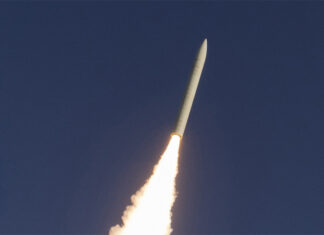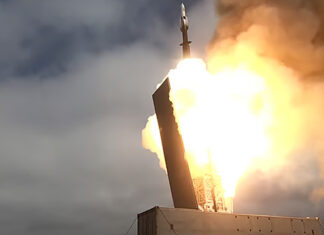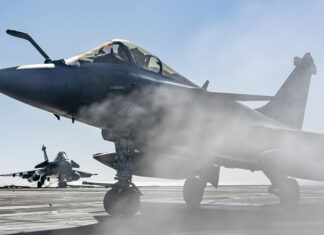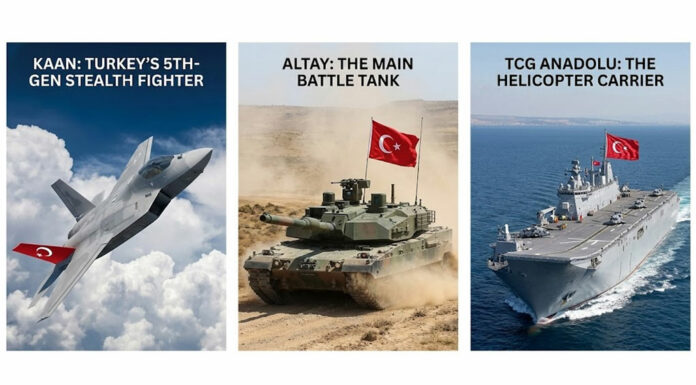Iran is preparing a massive force of small but highly capable combat elements capable of disrupting oil transportation through the Persian Gulf and the Straight of Hurmoz choke point. The Iranians have developed unique operational concepts employing coordinated swarm attacks that could effectively defeat large, well protected surface combatants such as those operated by the allied naval forces present at the Gulf. Many of these Swarm elements are currently stationed at the naval base at Bandar Abbas, acting as the Swarm’s ‘Hornets Nest’ at the southern end of the Hurmoz Straits in the Persian Gulf. In recent, highly publicized naval exercises held by Iran’s Revolutionary Guards’, swarm attacks were demonstrated by engaging targets from extended range by anti-ship missiles, while smaller fast boats were closing in at high speed, firing rockets and Rocket propelled Grenades (RPG) from very short range.


In recent years Iran is escalating its swarm capabilities to higher levels, with the development of indigenous weapons and platforms tailored for the Persian Gulf Theater of operation. Among these elements are mini submarines, amphibian seaplanes, high speed missile boats and medium range anti-ship missiles. All are designed as compact, cost efficient element that together, creating a force multiplier that cannot be ignored even by the world’s largest, most capable navies.

A key element in this ‘hornets nest’ is the Ghadir mini-submarine. The first two locally built subs were delivered in 2008 and this year during a visit at the base four subs were visible. These submarines built for short missions operating at shallow water, carrying out coastal reconnaissance, mine laying and engagement of surface targets, including moving vessels and oil rigs. Mining by submarines could become one of Iran’s modus operandi as detection or attribution of such action to the actual perpetrator is almost impossible.
Another element of the hornets nest was unveiled this week, as Iran’s Revolutionary Guards naval units displayed over a dozen planes during an official visit of the Guards’ commander, brig. General Ahmad vahidi at Bandar Abbas. Unveiled as a prototype in 2006, Bavar-2 is designed to operate as a rapid reaction force, equipped with aerial cameras and communications links transmitting images in real-time to command centers at sea or on land. The seaplane is also equipped with a machine gun. It is flown by a single pilot and is fitted to operate in day or night, using night vision devices.
In August 2010 the Iranians unveiled the ‘sting’ of the hornets – the new Zulfikar fast patrol boats (shown in the video below), an all-aluminum built fast boat armed with Iranian-made Nasr-1 medium range anti-ship missiles. (actually, an Iranian version of the Chinese C-704 missile). The Iranians plan to deploy large numbers of these boats, armed with the locally produced missiles, being able to saturate the defenses of highly protected surface vessels.

The new Bavar-2 Wind in Ground Effect (WIG) amphibian seaplane, designed to perform short range maritime surveillance, coastal patrol and provide target acquisition for the Zulfiqar fast boats, enabling them to launch their missiles at maximum range, thus avoiding counter attack from the surface. As a WIG amphibian, Bavar-2 has unique capabilities to ‘sea skim’ just above wave-top level, or perch at sea level, thus evading detection by hostile radars. Typically, such planes cruise at a speed of 130 km/h and perform optimally at an altitude of few meters above the sea although, technically some WIG designs can reach a maximum altitude of 300 meters.
In times of crisis it is assumed that the fast boats, submarines and seaplanes will disperse to many coastal locations, from where they will be able to launch surprise attacks against merchant ships, tankers or military targets. The submarines and amphibians will provide the eyes and ears for the missile carrying fast fast boats, which could group into attack swarms to strike and disperse immediately after it, thus making it difficult for the enemy to launch an effective counter strike.
Related posts:





















